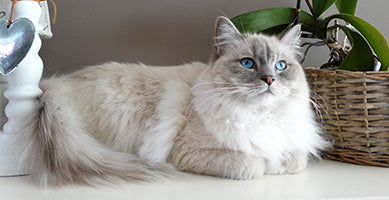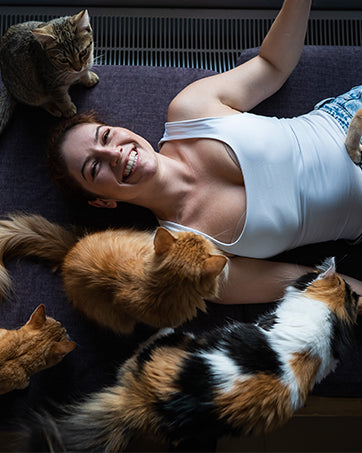Jessica W. Kelvin - Mar.05.2024
Why Do Cats Eat Grass?
7 Insights into Feline Behavior

Why Does My Cat Lick Me?
HHave you ever found yourself enjoying a quiet moment, only to be jolted back to reality by the rough tongue of your feline friend? If so, you're not alone. Many cat owners are familiar with this peculiar but endearing behavior. But why do cats lick their human companions? While it might seem like a simple question, the answer delves into the complex world of feline behavior and communication. Understanding why your cat licks you can shed light on their emotional state, deepen your bond, and even help you better meet their needs. From showing affection to marking their territory, cats have various reasons for this behavior, each offering a glimpse into their unique way of expressing love and establishing connections. As we explore these reasons, remember that each cat is an individual, and their reasons for licking may vary. So, let's dive into the fascinating reasons behind this common feline behavior, unraveling the mystery of why your cat might see you as more than just their owner, but as part of their family.
Why Does My Cat Lick Me?
Have you ever found yourself lounging on the couch, lost in a book or your favorite TV show, when suddenly, a tiny, rough tongue starts making its way across your hand? If you're a cat owner, you've likely experienced this peculiar yet endearing gesture. Cats are mysterious creatures, and their behaviors often leave us both amused and puzzled. One such behavior is licking their human companions. While dog owners might interpret licking as a clear sign of affection, the reasons behind why cats do it can be more nuanced.
Understanding why your furry friend chooses to lick you can deepen the bond you share with them. It's a behavior rooted in their instincts and social interactions. So, let's dive into the world of feline affection and unravel the mystery behind those gentle, ticklish licks. From signs of affection to territorial claims and everything in between, understanding your cat's licking habits is a journey into their heart and mind.
Territorial Behavior
Cats are known for their territorial instincts, which play a significant role in their interactions and behavior. When your cat licks you, it's not just an act of affection; it's also a way for them to mark their territory. Yes, you heard that right—you're being claimed! Cats have scent glands located on various parts of their body, including their cheeks, paws, and tail area. When they lick you, they're transferring their scent to your skin, effectively saying, "This human belongs to me."
This behavior is deeply ingrained in their instincts. In the wild, marking territory is crucial for a cat's survival, as it communicates to other cats which areas are claimed and who they belong to. By marking you as their own, your cat is integrating you into their perceived 'territory'—a sign of trust and familiarity. While this might seem a bit possessive, it's a natural way for cats to feel secure in their environment and their relationship with you.
Understanding this aspect of your cat's behavior can be quite enlightening. It sheds light on the complexity of their social dynamics and the depth of their bond with you. Recognizing that you are considered part of their 'territory' can help you appreciate the subtle ways in which they express their trust and affection.

Grooming and Care
Grooming plays a central role in the life of a cat. It's not just about cleanliness; it's a fundamental part of their social interactions. When cats lick each other, it's a sign of mutual respect and affection, often shared between close family members or friends within a group. This behavior, extending beyond simple grooming to become a social activity, is known as mutual grooming or allogrooming. When your cat decides to groom you, it's a clear sign that they view you as a part of their family, a trusted member of their inner circle.
This grooming behavior is deeply rooted in their kittenhood. Cats learn to groom from their mothers, who lick them to clean them and stimulate their bodily functions when they're young. As they grow, grooming becomes a self-soothing behavior that helps them manage stress and feel comfortable. When they extend this behavior to you, it's not only a sign of trust and care but also an indication that they feel relaxed and safe in your presence.
Moreover, grooming is a cat's way of caring for their loved ones. By licking you, they're trying to take care of you in the best way they know how. It's their way of saying, "You're part of my family, and I want to keep you clean and safe." While we might not need our cats to clean us, this behavior is a touching testament to the depth of their affection and the seriousness with which they take their role in our lives.
Cats:Theobromine Toxic Consumption
Most Cats: 1-10 lbs(0.45-4.6 kg), Large Cats11-25 lbs(5-11.4 kg)
Cacao Beans: Most Cats> 0.05 oz, Large Cats> 0.5 0z
Unsweetened Baking Chocolate: Most Cats> 0.2 oz, Large Cats>2 0z
Dark Chocolate: Most Cats> 0.5 0z, Large Cats>7 oz
Milk Chocolate: Most Cats>1.5 0z, Large Cats>16.5 0Z
White Chocolate: Most Cats>360 oz, Large Cats>4000 0z
Cocoa Powder: Most Cats> 01 0z, Large Cats>10z
Cocoa Bean Mulch: Most Cats>0.1 0z, Large Cats>1 0z
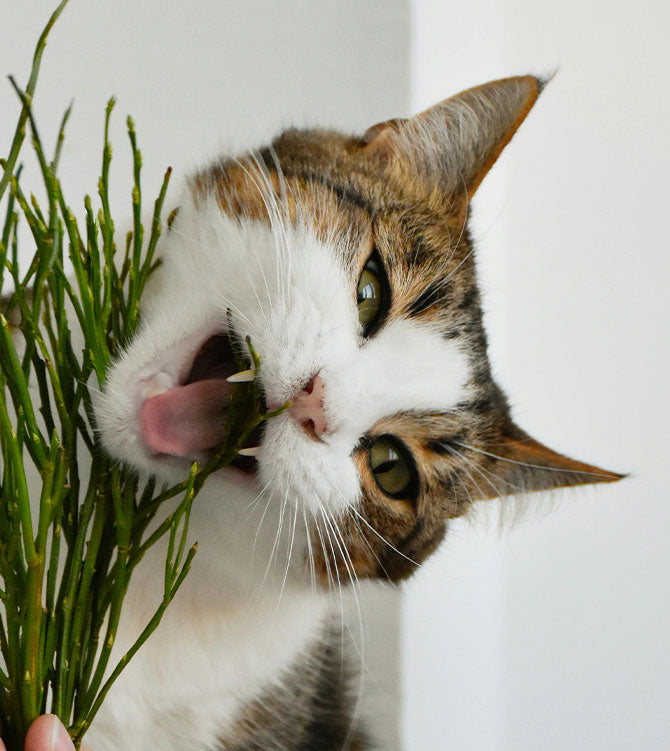
Showing making procedure is a good way to guarantee product quality
Stress Relief
Eating grass can also serve as a form of stress relief for cats, providing a calming activity that distracts from anxiety or boredom.
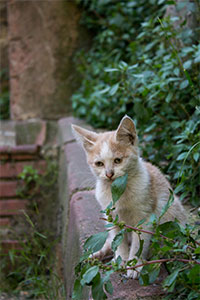
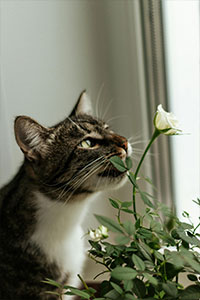
Get customer attention by clean visual and video
Instinctual Actions
Grass eating is an instinctual behavior that may stem from a cat's need to seek out alternative food sources or to induce vomiting to clear their stomachs of indigestible materials.
Seeking Attention
Cats are often stereotyped as aloof and independent creatures, but in reality, they seek affection and attention just as much as any pet. Licking is one of the many ways a cat might communicate its desire for interaction. When your cat licks you, it could be their way of saying, "Hey, look at me! I need some love right now." It's a gentle reminder that they crave your touch, your voice, and your attention.
This behavior is particularly common in cats that have a strong bond with their owners. They understand that licking leads to petting or cuddling, reinforcing this behavior as a positive way to seek attention. If your cat licks you and then pauses to look at you, it's likely they're waiting for your response. Engaging with them, whether through petting, talking, or simply acknowledging their presence, can strengthen your bond and reinforce positive social behaviors.
Understanding this aspect of your cat's behavior is crucial. It allows you to respond more attentively to their needs, ensuring they feel loved and valued. It's also an opportunity to observe any changes in their behavior, which could indicate health issues or emotional distress. By paying attention to when and how often your cat seeks attention through licking, you can gain insights into their well-being and ensure they remain a happy and healthy part of your family.
Article credit: Heidi Cohen (https://heidicohen.com/use-blog-to-sell/)
Digestive Aid
Grass acts as a natural laxative, helping cats pass hairballs or other indigestible items through their digestive tract more easily.
Elimination of Parasites
It's also theorized that grass eating may help cats eliminate intestinal parasites, although this benefit is more anecdotal than scientifically proven.
Taste and Curiosity
Cats are naturally curious creatures, often exploring the world through their senses. Taste and texture play significant roles in how they interact with their environment, including their human companions. When your cat licks you, part of their motivation might be driven by the taste of your skin. It sounds odd, but to a cat, the salts and natural oils present on human skin can be intriguing.
This curiosity is particularly evident in kittens and young cats, who are in the process of discovering everything around them. Licking is not only a sensory exploration but also a learning behavior. Through this action, they gather information about their surroundings, including you. The act of licking allows them to familiarize themselves with your scent, your taste, and the feel of your skin, all of which help in recognizing you as a significant part of their lives.
Moreover, the texture of human skin is different from their fur or the fur of their feline companions. The novelty of this texture can be appealing, leading them to lick as a way of exploring this difference. While it might seem like a minor detail to us, for cats, understanding and exploring these textures is a part of how they understand the world and their place within it.
Understanding your cat's curiosity can enhance your appreciation of their behavior. It reminds us that our feline friends are always learning and interacting with their environment in complex ways. So, the next time your cat licks you, remember it's not just an act of affection or territorial marking; it's also a sign of their inquisitive nature and desire to know more about you.
Conclusion
Cats are fascinating creatures, and their behavior, though sometimes puzzling, is rich with meaning. Licking is a multifaceted behavior that encompasses affection, territoriality, grooming, attention-seeking, and curiosity. Each lick from your cat is a small insight into their world, their thoughts, and their feelings towards you.
By understanding the reasons behind why your cat licks you, you can better appreciate these moments, recognizing them as signs of love, trust, and curiosity. It encourages us to pay closer attention to our pets' behavior, understanding their needs and emotions more deeply. So, the next time you find yourself on the receiving end of a cat's lick, take a moment to consider what they might be telling you. It's a small gesture that holds a world of meaning, strengthening the bond you share with your furry companion.
How to Safely Introduce Grass to Your Cat
Suitable Types of Grass
Certain types of grass are more beneficial and safer for cats, including wheatgrass, which is often sold as "cat grass."
Growing Your Own Cat
Grass
For the safety and health of your cat, consider growing your own cat grass at home. It's a simple and effective way to ensure they're getting a safe product.
Alternative Behaviors and Solutions
Dietary Supplements
If your cat shows an excessive interest in eating grass, it might indicate a dietary deficiency. Consult with a veterinarian about supplementing your cat's diet.
Behavioral Enrichment
Providing toys, climbing structures, and engaging activities can reduce your cat's inclination to eat grass by offering alternative forms of stimulation.
Why Do Cats Eat Grass?
Exploring the curiosity behind this behavior reveals a complex blend of nutritional, psychological, and instinctual factors. Understanding these can help cat owners provide better care and enrichment for their feline friends.
Owner Experiences and Advice
Personal Anecdotes
Many cat owners have observed their pets eating grass and have noted the benefits or concerns that came with it. Sharing these experiences can offer valuable insights for other pet owners.
Expert Recommendations
Veterinarians and animal behaviorists can provide professional advice on managing grass-eating behavior, ensuring it remains a safe and positive experience for your cat.
FAQs
Cats should not eat chocolate ice cream; not only is chocolate toxic to cats, but ice cream often contains toxic ingredient propylene glycol. Ingesting propylene glycol can lead to anemia in cats.
Say it at the end
Understanding why cats eat grass sheds light on their complex behaviors and the natural instincts that drive them. By providing safe, suitable grass and paying attention to the underlying reasons for this behavior, cat owners can ensure their feline companions lead happy, healthy lives.



